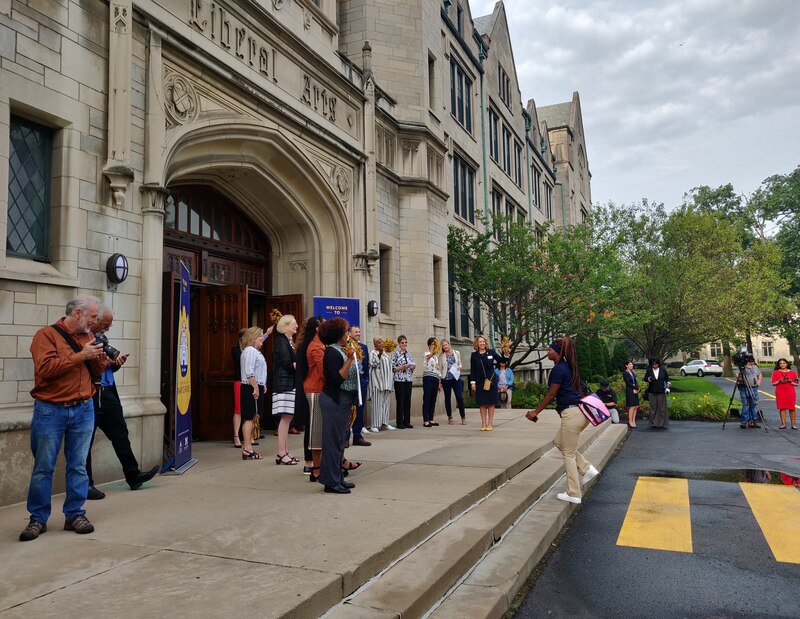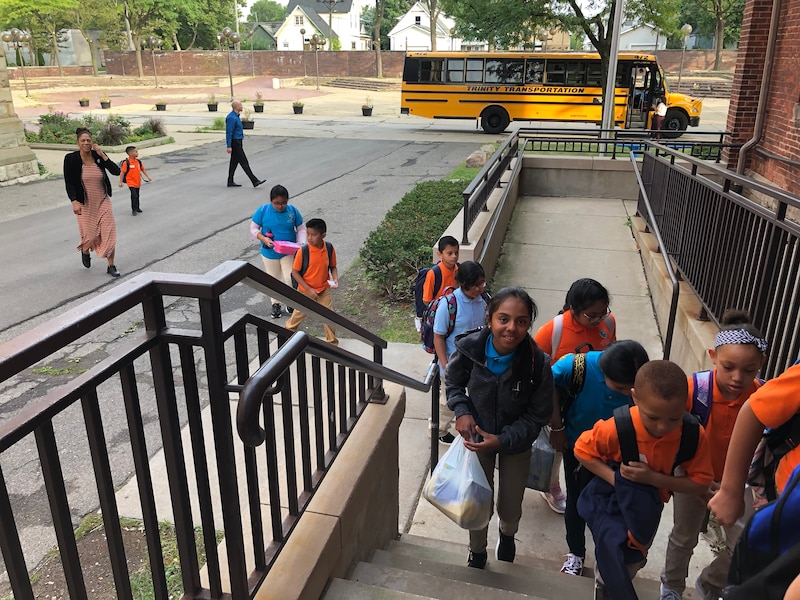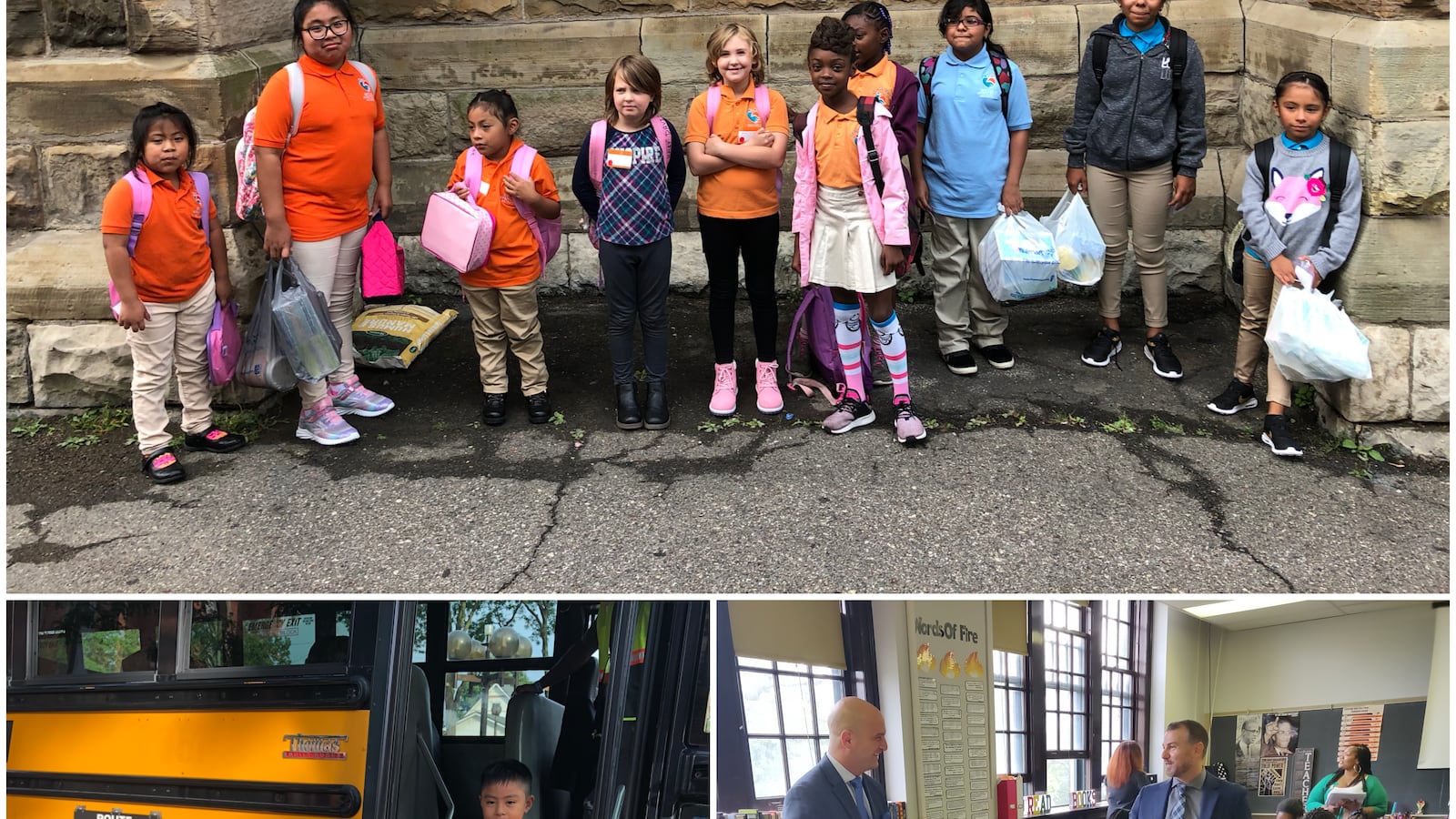On the first day at the School at Marygrove — a new, experimental high school focused on engineering and social justice — school staff cheered and shook pom-poms as students filed into a nearly century old stone building, glancing back tentatively at the row of TV cameras pointed at them.
It was an unusual parade for most incoming freshmen high schoolers. But Marygrove, as one of the nation’s first “cradle to career” schools, is itself unusual.
At about the same time, some 10 miles away on the city’s southwest side, there were no TV cameras. But in a third grade classroom at Escuela Avancemos, a Detroit charter school, there was no time to waste as literacy skills were woven into typical first-day instruction, like going over the class rules.
After all, the stakes are high this year for third graders at Escuela Avancemos — and throughout Michigan — who must prove they’re on track with reading in order to make it to fourth grade next year.
Tuesday marked the first official day of the school year in Michigan, including in the Detroit school district and many charter schools in the city.
The first day took place against the backdrop of the third grade reading law and that of the Detroit district’s effort to create new schools that will appeal to more parents, in a market where many schools are struggling to grow enrollment.
Here’s how the first day played out at two schools Chalkbeat Detroit visited Tuesday:
The School at Marygrove
This year, just ninth graders will be enrolled at Marygrove. But the school has big plans for an early childhood center, a K-8 school, and a residency program for college students going into teaching — creating a “cradle to career” campus in Detroit.
“It’s already exciting to be on the campus and see high school students here, but imagine what this will look like in the years to come,” Detroit Superintendent Nikolai Vitti told reporters Tuesday after taking a tour of the building. During that tour, he shook hands with teachers and chatted up students as he filed through a checker-tiled hallway lined with blue lockers.
The high school will also one day include a dual-enrollment program allowing students to take college courses right on campus.
The Kresge Foundation is investing $50 million into the effort and the Detroit Public Schools Community District is also partnered with the University of Michigan to build a new and innovative teacher residency program modeled after medical residencies.
So far, 2019 freshmen are starting school with one such resident, an engineering teacher. The remaining six teachers are veterans, attracted to Marygrove from charter schools or outside of the district, its principal, Nir Saar, said.
Saar said Marygrove students will receive an engineering-focused education, taught through a social justice lens. School staff reached out to local citizens and community organizers engaged in social justice issues. The goal: to develop opportunities for Marygrove students to work with them on a “project-based curriculum” to help solve problems in Detroit.
“I don’t know that I’ve ever seen people so eager to come to the first day and engage. I think they feel like they’re part of something special, and they should,” Saar said.
Although the school has attracted many students from outside of the district, Vitti said that his vision is for it to become a neighborhood school. Roughly 60 percent of the students enrolled live within a 2-mile radius, according to Vitti.
One student’s mother, Magda Pecsenye, said her son was excited about the focus on engineering and social justice at Marygrove. He had chosen the new school over the private school that his brother attends and over the public schools in Ann Arbor, where his father lives.
“They announced that they were doing this school on this campus that was going to be a lab school for the University of Michigan School of Education,” Pecsenye said. “And I kind of jokingly said ‘I would punch a kitten to get my kid into a lab school.’”

Escuela Avancemos
The first day in Brennah Donahue’s third-grade class was all about learning the rules — how to walk into the classroom, where to put your backpack once inside, even how to open your carton of milk at breakfast. But Donahue couldn’t resist throwing in a mini English lesson as she prepared for the year ahead.
Once a student has completed all the steps of moving into a new classroom, she said, “then he can commence — or begin — his breakfast.”
Donahue needs to squeeze in every vocabulary word she can. Even by the accountability-obsessed standards of a state that now has two separate school rating systems, the stakes are especially high this year for her students at Escuela Avancemos, which enrolls roughly 300 students in grades K-6.
A tough new third-grade reading law means that students who fall too far behind in reading could be held back at the end of this year. As many as 5,000 kids could be retained in the third grade statewide, a six-fold increase from previous years. The impact of that mandate will be felt especially in places like Detroit, where widespread child poverty weighs down test scores. The law, reachers say, also has the potential to hold back a larger proportion of students in charter schools, such as Escuela Avancemos, than those in traditional public schools.
The goal is to put an end to a two-decade period during which Michigan’s reading scores have stagnated while other states have progressed. While test scores released last week offered some hope that reform efforts in Detroit could prove fruitful, the picture remains concerning across Michigan’s race, class, and geographic divides.
On the first day of school, however, parents see their children not as data points but as individuals full of possibility.
“Hopefully he’ll learn as much as possible and be more college ready than I was,” said Kyle Lithgow, 23, a native Detroiter whose son is starting kindergarten at Escuela Avancemos.
He acknowledged some creeping worries as his son starts classes in the same city that he has found to be short on opportunity.
“Is it really getting better?” he asked a reporter. “Is this school good?”
There’s no straightforward answer, especially after a tumultuous year that saw several schools close in Detroit and others forced to move campuses — including Escuela Avancemos.
Still, the school, which was on a state reform list for low academic results as recently as 2014, proved resilient. It is settled into a former parochial school in Southwest Detroit that is outfitted with a chemistry lab, a luxury for a K-6 school. And, thanks to rising test scores, Escuela Avancemos recently won a major grant from the Detroit Childrens Fund, a local nonprofit. The money will go toward a new playground, new curriculum, and a $3,000 retention bonus for teachers.
In recent years, the school had lost as many as 70 percent of its teachers. That number matches Lithgow’s experience in Detroit, where he, too, attended school.
Every good teacher, he said, always seemed to be on their way out the door. But this year, with bonuses funded, Escuela school only had to replace one teacher out of around 20. Teacher retention is associated with academic gains for students.
“It has boosted us,” said Sean Townsin, principal of Escuela Avancemos, of the grant.
Parents gathered outside the school Tuesday morning to grab one last photo and hug. Many were carrying tales of frustration with Detroit schools, as well as the hope that this year would be different.
“In other schools, they have huge classes,” said Carlos Cabrera, who has five children and other young relatives at the school. “Here, they can pay more attention.”


